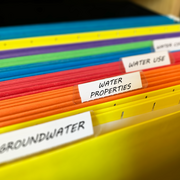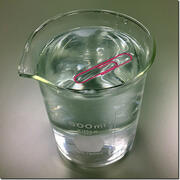Water is indeed essential for all life on, in, and above the Earth. This is important to you because you are made up mostly of water. Find out what water does for the human body.
• Water Science School HOME • Water Basics topics •
The Water in You: Water and the Human Body

Think of what you need to survive, really just survive. Food? Water? Air? Facebook? Naturally, I'm going to concentrate on water here. Water is of major importance to all living things; in some organisms, up to 90% of their body weight comes from water. Up to 60% of the human adult body is water.
According to Mitchell and others (1945), the brain and heart are composed of 73% water, and the lungs are about 83% water. The skin contains 64% water, muscles and kidneys are 79%, and even the bones are watery: 31%.
Each day humans must consume a certain amount of water to survive. Of course, this varies according to age and gender, and also by where someone lives. Generally, an adult male needs about 3 liters (3.2 quarts) per day while an adult female needs about 2.2 liters (2.3 quarts) per day. All of the water a person needs does not have to come from drinking liquids, as some of this water is contained in the food we eat.
Water serves a number of essential functions to keep us all going
- A vital nutrient to the life of every cell, acts first as a building material.
- It regulates our internal body temperature by sweating and respiration
- The carbohydrates and proteins that our bodies use as food are metabolized and transported by water in the bloodstream;
- It assists in flushing waste mainly through urination
- acts as a shock absorber for brain, spinal cord, and fetus
- forms saliva
- lubricates joints
According to Dr. Jeffrey Utz, Neuroscience, pediatrics, Allegheny University, different people have different percentages of their bodies made up of water. Babies have the most, being born at about 78%. By one year of age, that amount drops to about 65%. In adult men, about 60% of their bodies are water. However, fat tissue does not have as much water as lean tissue. In adult women, fat makes up more of the body than men, so they have about 55% of their bodies made of water. Thus:
- Babies and kids have more water (as a percentage) than adults.
- Women have less water than men (as a percentage).
- People with more fatty tissue have less water than people with less fatty tissue (as a percentage).
There just wouldn't be any you, me, or Fido the dog without the existence of an ample liquid water supply on Earth. The unique qualities and properties of water are what make it so important and basic to life. The cells in our bodies are full of water. The excellent ability of water to dissolve so many substances allows our cells to use valuable nutrients, minerals, and chemicals in biological processes.
Water's "stickiness" (from surface tension) plays a part in our body's ability to transport these materials all through ourselves. The carbohydrates and proteins that our bodies use as food are metabolized and transported by water in the bloodstream. No less important is the ability of water to transport waste material out of our bodies.
Sources and more information:
- Mitchell, H.H., Hamilton, T.S., Steggerda, F.R., and Bean, H.W., 1945, The chemical composition of the adult human body and its bearing on the biochemistry of growth: Journal of Biological Chemistry, v. 158, issue 3, p. 625-637.
- The Nature of Water: Environment Canada
- Project WET (PDF)
Below are other science topics associated with water and the human body.
Water Properties Information by Topic
Surface Tension and Water
Water, the Universal Solvent
Capillary Action and Water
Adhesion and Cohesion of Water
Below are multimedia items associated with water and the human body.
Water is indeed essential for all life on, in, and above the Earth. This is important to you because you are made up mostly of water. Find out what water does for the human body.
• Water Science School HOME • Water Basics topics •
The Water in You: Water and the Human Body

Think of what you need to survive, really just survive. Food? Water? Air? Facebook? Naturally, I'm going to concentrate on water here. Water is of major importance to all living things; in some organisms, up to 90% of their body weight comes from water. Up to 60% of the human adult body is water.
According to Mitchell and others (1945), the brain and heart are composed of 73% water, and the lungs are about 83% water. The skin contains 64% water, muscles and kidneys are 79%, and even the bones are watery: 31%.
Each day humans must consume a certain amount of water to survive. Of course, this varies according to age and gender, and also by where someone lives. Generally, an adult male needs about 3 liters (3.2 quarts) per day while an adult female needs about 2.2 liters (2.3 quarts) per day. All of the water a person needs does not have to come from drinking liquids, as some of this water is contained in the food we eat.
Water serves a number of essential functions to keep us all going
- A vital nutrient to the life of every cell, acts first as a building material.
- It regulates our internal body temperature by sweating and respiration
- The carbohydrates and proteins that our bodies use as food are metabolized and transported by water in the bloodstream;
- It assists in flushing waste mainly through urination
- acts as a shock absorber for brain, spinal cord, and fetus
- forms saliva
- lubricates joints
According to Dr. Jeffrey Utz, Neuroscience, pediatrics, Allegheny University, different people have different percentages of their bodies made up of water. Babies have the most, being born at about 78%. By one year of age, that amount drops to about 65%. In adult men, about 60% of their bodies are water. However, fat tissue does not have as much water as lean tissue. In adult women, fat makes up more of the body than men, so they have about 55% of their bodies made of water. Thus:
- Babies and kids have more water (as a percentage) than adults.
- Women have less water than men (as a percentage).
- People with more fatty tissue have less water than people with less fatty tissue (as a percentage).
There just wouldn't be any you, me, or Fido the dog without the existence of an ample liquid water supply on Earth. The unique qualities and properties of water are what make it so important and basic to life. The cells in our bodies are full of water. The excellent ability of water to dissolve so many substances allows our cells to use valuable nutrients, minerals, and chemicals in biological processes.
Water's "stickiness" (from surface tension) plays a part in our body's ability to transport these materials all through ourselves. The carbohydrates and proteins that our bodies use as food are metabolized and transported by water in the bloodstream. No less important is the ability of water to transport waste material out of our bodies.
Sources and more information:
- Mitchell, H.H., Hamilton, T.S., Steggerda, F.R., and Bean, H.W., 1945, The chemical composition of the adult human body and its bearing on the biochemistry of growth: Journal of Biological Chemistry, v. 158, issue 3, p. 625-637.
- The Nature of Water: Environment Canada
- Project WET (PDF)
Below are other science topics associated with water and the human body.
Water Properties Information by Topic
Surface Tension and Water
Water, the Universal Solvent
Capillary Action and Water
Adhesion and Cohesion of Water
Below are multimedia items associated with water and the human body.






